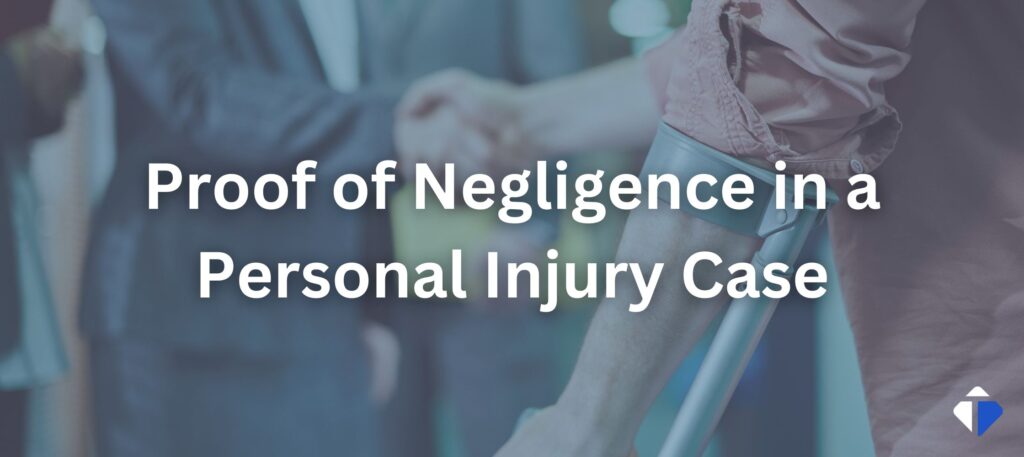What Is Proof of Negligence in a Personal Injury Case?
To recover money in a personal injury claim, the injured party must prove the at-fault party acted negligently and that their negligence led to the injury.
The Tadchiev Law Firm, P.C., has helped accident victims throughout Queens, NY, gather the proof necessary to build a persuasive personal injury case and recover compensation for medical bills, lost income, and other losses suffered due to someone else’s negligence.
Demonstrating that a driver’s negligence caused a car crash typically requires an investigation of the accident. Our Queens car accident attorneys have extensive experience investigating crashes and helping injured people seek full compensation. Contact The Tadchiev Law Firm, P.C. to discuss how a personal injury lawyer can help you.
We serve clients across New York, including Nassau County, New York City, Long Island, and Floral Park.

The Four Elements of Negligence
In a legal proceeding, negligence is the failure to behave with the level of care that a reasonable person would have exercised under the same circumstances. Whether the defendant named in a personal injury lawsuit acted as a reasonable person would have is a question the jury answers when an injury claim goes to court.
To prove negligence, the injured party bringing the case must show:
- The defendant had a legal responsibility to act with reasonable care
- The defendant breached their legal duty to the plaintiff
- The defendant’s breach of duty was the most closely related cause of the plaintiff’s injuries
- The plaintiff’s injury caused them compensable harm
As members of society, we all owe a duty to each other to act as a reasonable person in our daily lives so that we do not pose a risk of harm to others. For example, we are to avoid driving recklessly or disregarding traffic laws because that poses a risk of injury to others.
Burden of Proof in Car Accident Claims
A Queens jury hearing a personal injury claim would be charged with deciding whether the evidence presented by the plaintiff proves the defendant acted negligently.
The burden of proof in a personal injury claim is a preponderance of the evidence. Proving an allegation by a preponderance of the evidence requires demonstrating that the allegation is more likely true than not true.
So, in other words, a jury decides whether the “weight” or “strength” of the evidence makes them believe the plaintiff.
The “beyond a reasonable doubt” standard of proof required in criminal cases is more rigorous than the preponderance of the evidence standard in civil lawsuits involving personal injury claims.
Get Started with your CaseCall Us at 718-380-1200
How To Prove Negligence in Your Personal Injury Case
If we take it as granted that one driver owes a duty of care to another, the plaintiff in a car accident case must prove:
- Breach of duty, or the defendant’s failure to obey traffic laws by driving recklessly or disregarding traffic signals. Evidence of this could come from:
- The police report and its description of the accident
- A guilty verdict in any separate criminal proceeding filed against the at-fault driver
- Witness statements
- Event data recorder information indicating the status of the defendant’s vehicle just before a collision, such as lack of braking or excessive speed
- Surveillance camera video, which may have captured the accident or the defendant’s vehicle just before the accident
- Defendant’s cellphone records, which may show use at the time of the crash, an indicator of distracted driving.
- Proximate cause of the plaintiff’s injury. In most cases, it should not be difficult to persuade a jury that a car accident was the cause of the plaintiff’s injury. However, we might strengthen the claim with:
- The police report and its description of the accident
- Medical records and doctors’ statements about treatment after the accident
- Photos of vehicle damage to indicate the force of impact of the crash
- Witness’s statements
- Actual damages. We would calculate the losses our client has incurred due to the accident and demand maximum compensation. Evidence supporting the claim for compensation may include:
- Medical bills
- Future medical bills
- Depositions substantiating absence from work and lost wages
- Car repair and diminished value estimates or declaration of total loss
- Records and receipts for additional expenses, such as a rental car or hired help
- Diagnostic records and expert medical opinion of lasting disability and loss of earning capacity
- Medical records and doctors’ statements as to the severity of the injury and the plaintiff’s pain and suffering
- Plaintiff’s and witness’s statements about the plaintiff’s pain and suffering, emotional distress, anxiety, inconvenience, loss of quality of life, loss of enjoyment of life, and loss of consortium
The Tadchiev Law Firm, P.C. has extensive experience with personal injury cases. If you have used up your Personal Injury Protection insurance benefits and still have outstanding medical expenses from the serious injuries you sustained, you may have other avenues for seeking compensation. A knowledgeable car accident attorney, Boris Tadchiev understands the types of documentation needed to build a persuasive case and help accident victims seek monetary compensation.
Get Started with your CaseCall Us at 718-380-1200
Contact Our Experienced Queens Personal Injury Attorneys
A personal injury attorney at The Tadchiev Law Firm, P.C., in Queens, is available to review your accident and injuries and discuss your legal options for proving negligence and seeking the compensation you are due based on the defendant’s breach of duty. Our personal injury lawyers can investigate the incident that led to your personal injuries, gather evidence of the defendant’s negligent behavior, and help you pursue the maximum compensation available based on personal injury law.
Our law firm can help you prove negligence in a personal injury claim. Our initial consultation about an accident claim is free. We do not charge legal fees unless we recover money for you. Contact us today.
